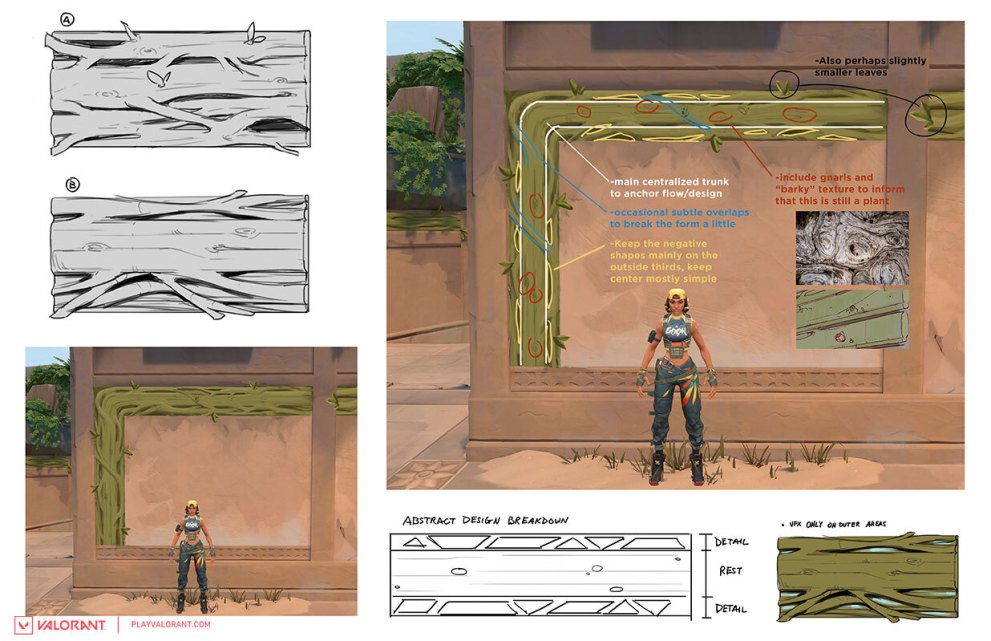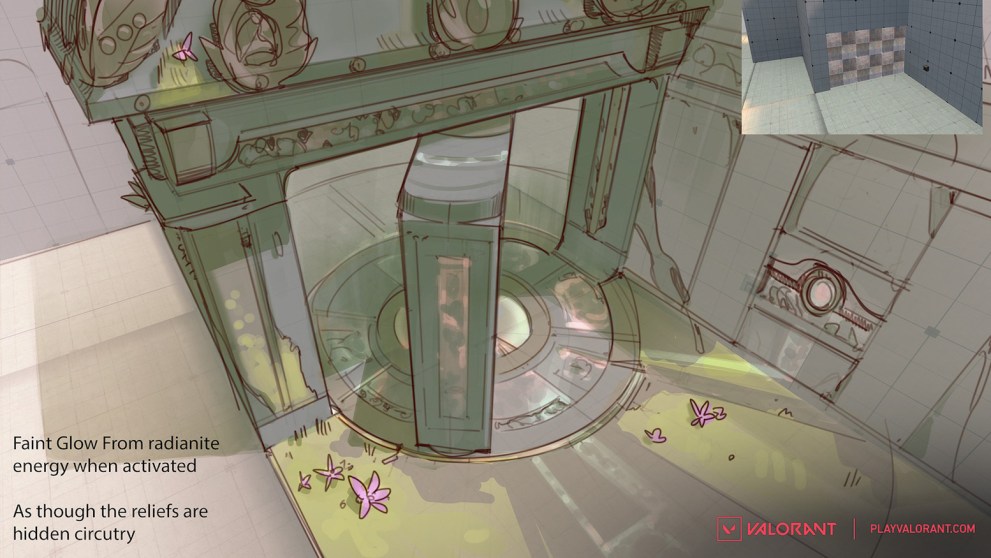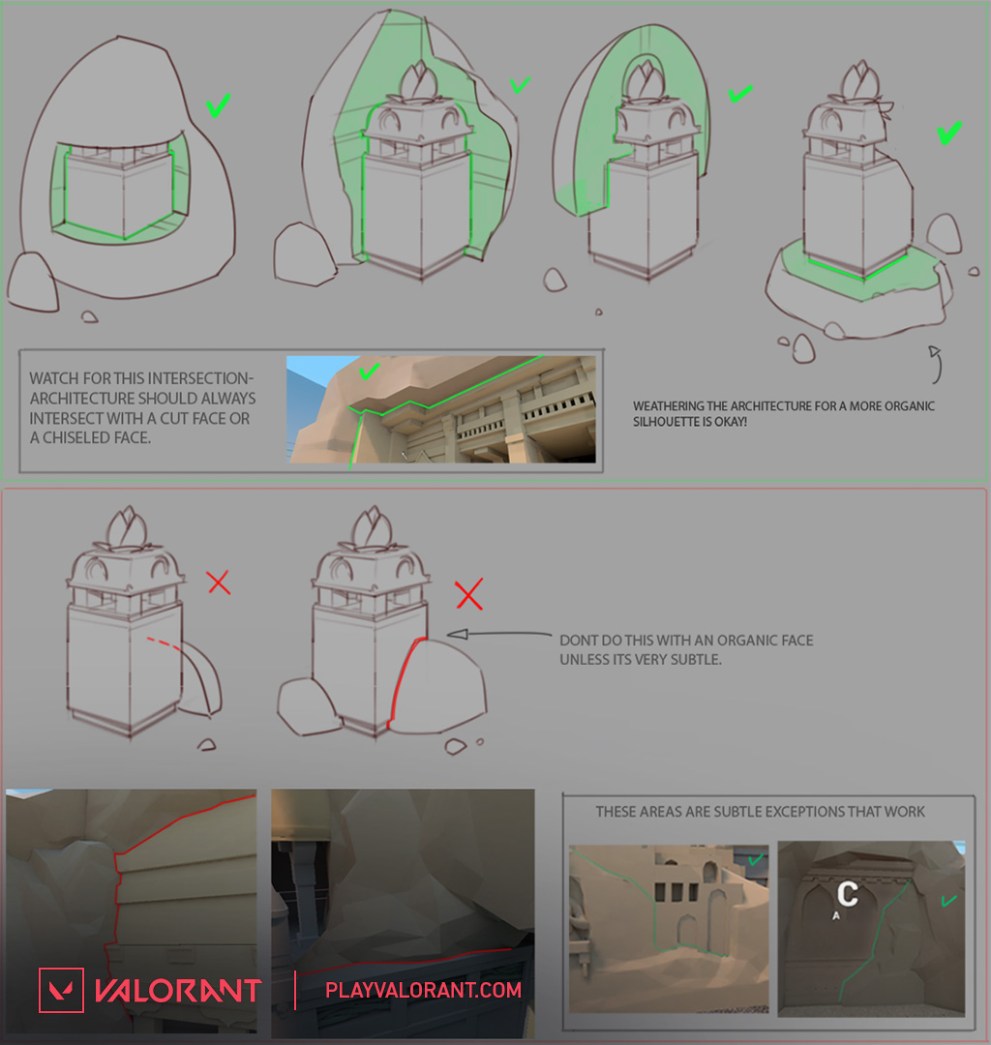Valorant’s latest map, Lotus, has now been added to the competitive queue for a little over a week, and it’s fair to say the community is still acclimatizing. Lotus is a fast and furious map on which the most popular strategies so far seem to boil down to hard rushing either of the three Spike sites. But there’s way more tactical depth to Lotus to be found, and there’s a fair bit of lore packed into its mysterious ancient city walls still to uncover.
Riot Games has now revealed a bunch of new details, from the inspiration behind Lotus’ aesthetic to the gameplay style that inspired its unusual design; specifically, with commentary from vev team members: lead environment artist George “Riot Dadsquad” Sokol; lead concept artist Brian “Peppy Yambino” Yam, and lead level designer Joe “Pearl Hogbash” Lansford.
New Lotus Lore Details

“When you’re looking at the compound from Attacker spawn, the first thing you’ll notice are the giant Lotus flowers above and around the ruins,” says Lead Environment Artist George “Riot Dadsquad” Sokol. “You’ll also notice giant vines that run throughout the map. The plants and vines grew to be abnormally large because they’re infused with radianite. The vines act as conduits for the radianite to power things around the ruins—like the two, giant rotating doors near A and C.”
“The idea was that these plants were mutated by radianite to absorb large amounts of energy from the sun due to their size. As you explore the map, you’ll see these giant lotus leaves encased in blue panels that act as power storage for various features on the map. The ancients who built this place found a way to encase these lotus leaves to extract the energy they’d absorbed.”

“We see in the launch trailer that Astra plays a huge role in investigating Lotus. Through her sight abilities and many of the visuals on the map, we’re hinting that there’s a connection between the peoples of this Earth and something greater,” explains Joe “Pearl Hogbash” Lansford, lead level designer. “Lotus was built by a civilization who appear to have been aware of some powerful presence in the mirrorverse. And you’ll see evidence of that in the different shrines and shape language throughout the map.”
How to Play Lotus According to the Dev Team

Lotus is the second map in the rotation with three sites, which the development team has explained was all about offering attacking teams the ability to pivot to different strategies mid-round. Related to that is the unusual rotating doors, and the breakable door that opens up a connector between A and B sites.
“A big design goal here was movement fluidity,” says Joe Lansford. “We wanted to allow teams to flex and pivot as the round progresses more easily than they often can on other maps.”
“Teams can very quickly flex between sites and areas. Taking door control gives strategy power as well, like pinching someone in B main for example… The audio and minimap cues also allow for some fun mind games. Yoru can do some interesting stuff with his teleport, activating the door on one side of the map then jumping to the other. Or not… The main goal is to create interesting movement and utility decisions for both teams.”
“We also have a great team of gameplay analysts who are very skilled, deeply analytical thinkers who help a ton with understanding how a map will play on live. Sometimes they raise red flags and help us make changes, and sometimes they help validate exactly what we were thinking.”
Lotus & (the lack of) Lineups

If you’ve played Lotus then you’ll probably have noticed pretty quickly that it’s not really a lineup-heavy map. There are some, of course, but the low ceiling of the ancient building that dominates the center of the map isn’t ideal for Agents like Sova or KAY/0. As it turns out, though, lineups aren’t really factored into map design. It’s the art that guides the process first and foremost.
“We were going through the process of picking different thematics for this new map and we eventually landed somewhere ancient,” Peppy Yambino says, “We took inspiration from the Petra ruins in Jordan. Petra has very interesting rock-cut architecture. And then somebody mentioned that we had an Indian agent in development. After doing some research, we found that India has similar kinds of ancient architecture. And we thought that lined up perfectly. So then we started looking towards India.” The elaborate, ancient compound in Lotus was inspired by Dravidian architecture and some of the more than 1500 rock-cut ruins that are found throughout India.
“We actually worked with a doctorate of Indian studies, Dr. Fiza Vasudeva, on Lotus. She’s a scholar from India who was also a consultant on Harbor,” Pearl Hogbash reveals. “So we finished the creative guide for the map after doing a bunch of research on the architecture and design elements we were after. Then we had Dr. V audit it for authenticity and asked her to add some of her own advice and details.”
While something like authenticity is always deliberate, sometimes in game development things also happen by accident. While teams try to be intentional in everything they do, occasionally they stumble onto something that just happens to work.
Take for example everyone’s favorite TikTok and YouTube topic—lineups. How much does the design team think about lineups when they create a map?
“I’m definitely not a lineup person. I play Brimstone and Breach, and for me there’s no such thing as a lineup,” Lansford said. “We measure areas for crosshair height, we look at corridor width for smokes and mollies, and we pay a lot of attention to how important angles play. But in terms of specific util lineups, we don’t really build anything like that intentionally. We just let the art kind of be the guide.”
Lotus joined the competitive queue with Patch 6.01; read the full update notes here if you haven’t already.
